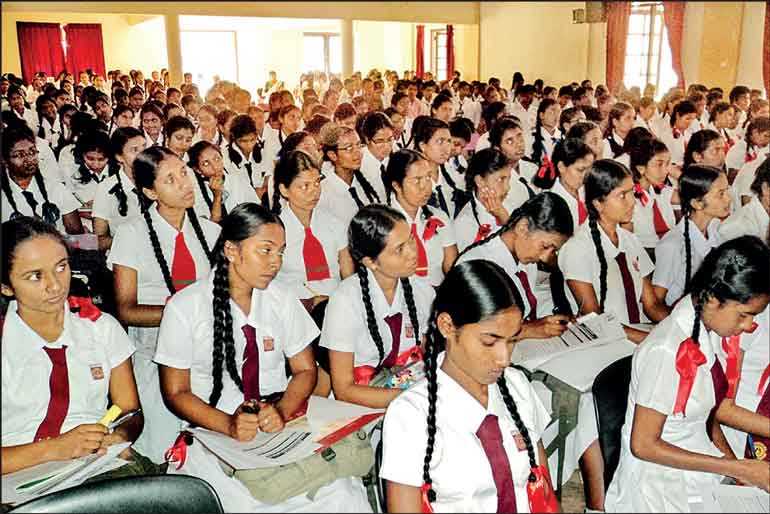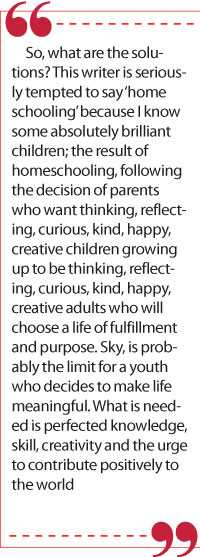Monday Feb 23, 2026
Monday Feb 23, 2026
Saturday, 30 January 2021 00:10 - - {{hitsCtrl.values.hits}}

Who we will become and what we will do in the world is often decided by the kind of education that we get in our impressionable years; primary and secondary education – Pic by Shehan Gunasekara
By Surya Vishwa
Let us embark on this topic by looking at what aspects are missing in society based on what we see wrong – of what should not happen.
Let us begin with crime. There are many kinds of crimes. There are the types of crimes where we can kill someone with a knife, or we can do so very elegantly without anyone knowing we are doing it. Often, we commit crimes against ourselves. Much of modern life is subjecting oneself to premature death, after living through life which is akin to torture. Much of this torture is inflicted because we may not fully realise the concept of true happiness. This non realisation begins with a mechanised education system that still runs on the wheels of industrialisation when it was designed to make humans cogs in a wheel.
The crime of torture on the brief human life of man, begins with modern man’s perception that money alone brings happiness. How many times have we heard parents say to their child; “Be anything you think would be exciting and bring you joy and allow you to make this world a better place; be a comedian, be a magician, be a forest grower, be a writer… be whatever that makes you creative and happy and a good person,”?
If you have not heard such a statement it is because few, very very very very very few parents would have reached the level of wisdom that enables them to say it. As far as most parents are concerned there are only three careers for their children; that of western doctors, lawyers and engineers.
Let us see what motivates these parents. Do they want their children to take on the vocation of doctors based on the philosophy that drove our ancient traditional physicians… i.e., to accrue merit in this life by healing another human being or even animal or plant/tree? (there was a branch of Ayurvedic healing called ‘Wruksha Ayurveda’). The mental construct of a traditional physician was based on detachment with material benefit – what mattered was the human duty of healing another living being. This is why no money was ever given directly to the hand of a traditional physician but rather kept on a betel leaf discreetly without the physician directly acknowledging it, because his purpose of treating the patient was not money; it is a human obligation.
Now let us contrast if this is the mental construct of most parents wanting their children to be doctors of the Western medical tradition. What is their motivation in wanting this profession for their children? The answer is; social prestige and money. At times this is achieved sacrificing the fundamentals of human values that should be central to the medical profession, although this writer has met several allopathic doctors who have stayed away from private practice and over medicalisation, some of them studying and integrating holistic methods to enable more effective healing and initiating health-focused charities.
Now let us look at the profession of law and examine why parents want their children to be lawyers. There is certainly a great need of justice in this world; there is need to ensure that the poor and the downtrodden enjoy equality of justice. But is this what is happening today? Examine the prisons of this country and one will find people who cannot afford to pay fines of a few thousands of rupees serving months and years in prison. They do not have luxury of a lawyer because they cannot afford it. So, do we have parents who say to their children, “Putha become a lawyer and set the world right. Use your talent to bring justice to the poor who cannot afford it. You may not become rich this way but you will be happy so accrue great merit by becoming a great lawyer and stand up for the poor though they may not be able to pay you.” I do not so far know any parent who has given this kind of advice to their child but I know that the father of my meditation teacher, categorically refused him permission to become a lawyer but lived to see his son become a trade unionist and truly defend, with excellent legal arguments, those who had no social voice.
Now let us take engineers. Do we have parents who want their children to become engineers because they want them to be creative, for example – solve problems connected with themes such as de-forestation, pollution and sustainability?
Engineers that… say for example … use tonnes of plastic of various textures that we throw out, or other non-biodegradable items or use nature-based methods such as clay innovatively in construction… Do parents say ‘become an engineer and save the planet from the damage man has done so far by mistaking the construction of concrete structures to be ‘development’
…? Sadly, few parents would say it.
A vicious cycle
So… what does this mean? It means that parents are creating a vicious cycle of stress, tension, non-satisfaction, want and greed. They are preparing their children for a life of craving, non-caring and a life based on money making alone and not on vibrancy of ideas.
So, what are the solutions? This writer is seriously tempted to say ‘home schooling’ because I know some absolutely brilliant children; the result of homeschooling, following the decision of parents who want thinking, reflecting, curious, kind, happy, creative children growing up to be thinking, reflecting, curious, kind, happy, creative adults who will choose a life of fulfillment and purpose. Sky, is probably the limit for a youth who decides to make life meaningful. What is needed is perfected knowledge, skill, creativity and the urge to contribute positively to the world.
One may or may not need a university degree for this. If one indeed registers for some interesting university degree of an academic discipline of one’s choice, the secret for success is
the marriage between one’s emotional will to change something in the world selflessly, one’s intellectual/technical skill to do so and the creativity and consistency with which one carries out such a task. The mastering of these is linked to the foundation we receive in our schools. Who we will become and what we will do in the world is often decided by the kind of education that we get in our impressionable years; primary and secondary education.
The 1998 Nobel prize winner in economics, Amartya Sen of India, who gave the discipline of economics a radical humane face hitherto unheard of, credited the Patha Bhavana primary and secondary school of Shanthiniketan, begun by Nobel laureate Rabindranath Tagore in 1901, for making him the kind of adult economist he became. His childhood schooling made him an original thinker who refused to follow the herd and thereby radically changed the framework of economics and juxtaposed it with the ideals of human welfare.
Discouraging examinations or competitive testing the school run by Shanthiniketan was known for prompting creativity of students with rich cultural influences from around the globe. In his recollections Sen had written how he around aged 10 overheard a teacher refer to another student as having a keen mind ‘although’ she passed her exams with high marks! This doubting of intelligence on account of excellence at exams (possible by rote learning) had made young Sen adamant to prove that he was indeed equipped with a keen mind ‘although’ he too scored very well at exams!
If only we had an education system today in this country that doubted the intelligence of exam takers! It is undoubtedly the non-conformist education and the wide exposure to arts and nature which created an adult economist who in turn influenced the creation of the UN Human Development Index because he was able to link with the concept of economics the other seemingly non linkable aspects such as the concept of freedom has with the concept of development which in turn is connected with aspects of gender and all of which has a relevance to social ills of hunger and poverty. Unlike most economists Sen has authored many books on a wide range of themes including economics, ethics, cultural identity, famines and understanding development from the concept of freedom. He is also known to be attuned to poetry.
If we are not creating more people like Amartya Sen, it is the fault of our primary and secondary models of education. It should be remembered that Rabindranath Tagore who created Shanthiniketan was a poet.
In Sri Lanka in a backdrop of education reforms in the making, it is therefore necessary that we consider the importance of looking at how the concept of integrated knowledge is vital to enhance creativity of thought and seek the ideas of our artistes to look at more connected thought processes. Education reforms carried out only through the lenses of academics and theoreticians cannot reach the full potential of creativity.
Sri Lanka’s legend in the legal field, Sri Lankabhimanya Christopher Gregory Weeramantry, Vice President of the International Court of Justice from 1997 to 2000 and Judge of the International Court of Justice from 1991 to 2000 was Lanka’s own example of how ethics, humanity, brilliance and creativity could be used to perfection in a career of law. Known for his literary skills in school and for his knowledge of history, the books authored by him show, like in case of Amartya Sen, a sharp and un-trapped mind.
It is creating minds such as these that should be the goal of our current education reformers in Sri Lanka. The path to this is to train teachers who will be able to impart enthusiasm and passion for knowledge and curiosity in students which is the turning point of brilliance. Importantly, it is necessary to depart from the polarisation of academic subjects and instead help students see the integrated nature of knowledge; the music within the sphere of maths (within the technicalities of music are mathematical components), maths within the sphere of art (Da Vinci’s painting sketches are full of mathematical equations). Would not school students react to maths differently if they are taught how geometry and symmetry are components of maths as they are brethren of art.
I recall reading a short story on how a knowledge of art history held a lawyer in good stead enabling him to handle a complex case involving a case of a theft of a famous painting; this was a work of short fiction but the point made was clear. Recently I was discussing with a friend about the integrating and mainstreaming of heritage concepts and was told of a contemporary Maori scholar who is examining the relevance of the incorporation of ancient Maori community law and values into the New Zealand legal system.
In similar vein, the two spheres of theatre and law was merged for creating vital societal and policy changes by Brazilian theatre practitioner, Auguste Boal who used theatre as a form of education tool. After serving briefly as a city councilor he introduced in the 1990s the method of legislative theatre to create through the concept of theatre a dialogue between voter and policy maker.
Let us continue this discussion in the weeks to come but for the moment let us conclude by stating that if progressive education reforms are to be unleashed to create purposeful and sensitive citizens, that we need the vital assistance of artists, filmmakers, musicians and poets; all those who are practitioners of creativity.
We publish below the link of an article contributed to the Harmony page in 2019 by Sri Lanka’s internationally acclaimed film maker Vimukthi Jayasundara on the need to re-haul Sri Lanka’s education system:
http://www.ft.lk/other-sectors/The-urgent-need-to-minimise-the-creation-of-ugliness/57-684051